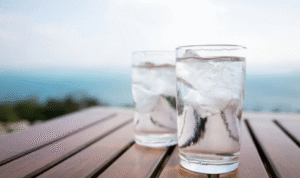If you’ve ever noticed your dishes coming out of the dishwasher with cloudy spots or your freshly washed hair feeling oddly dull, you might be dealing with something invisible yet persistent — hard water. It’s one of those things most people don’t think about until the symptoms start stacking up. And then, suddenly, you’re wondering if your water is quietly sabotaging your appliances, skin, and even your morning coffee.
When “Hard” Doesn’t Mean Tough — Just Loaded
The term “hard water” sounds dramatic, but it’s not dangerous. It’s simply water that contains higher concentrations of minerals like calcium and magnesium. These minerals aren’t bad — in fact, they’re good for you in moderation — but they can cause a whole list of small annoyances over time. Think mineral buildup around faucets, soap scum that just won’t budge, or a white film on your shower glass that laughs at your cleaning efforts.
If you live in a rural area or rely on a private well, you’ve probably asked yourself at some point: is well water hard water? The answer is usually yes — or at least, it’s more likely to be. Unlike city-treated water, well water comes straight from underground aquifers, where it passes through layers of rock that naturally add minerals. That means while it’s often fresher and free from chlorine, it also tends to carry those extra “hard” minerals that build up in your pipes and fixtures.
Everyday Clues That Something’s Off
You don’t need to be a plumber or a chemist to suspect hard water. It reveals itself in the most mundane moments — brushing your teeth, doing laundry, taking a shower.
If your soap refuses to lather the way it should, that’s your first clue. Hard water makes it harder (pun intended) for soap and shampoo to do their job, leaving you feeling less clean even after scrubbing twice as long. Towels come out stiff, not fluffy. Clothes fade faster, and your favorite black shirt starts looking grey after just a few washes.
Maybe your kettle has developed a crusty white ring at the bottom — that’s limescale, a calling card of hard water. Faucets and showerheads often collect the same stubborn deposits. And if your skin feels dry or itchy no matter how much lotion you use, minerals could be the culprit.
These signs can sneak up gradually, which is why people often wonder how to know if i have hard water before realizing they’ve been living with it for years.
Why Hard Water Matters More Than You Think
Sure, hard water isn’t toxic. It won’t make you sick. But over time, it quietly costs you — in repairs, replacements, and frustration.
Those mineral deposits don’t just make your shower doors cloudy; they can clog pipes, shorten the lifespan of water heaters, and reduce the efficiency of washing machines and dishwashers. A thin layer of limescale inside an appliance forces it to work harder, using more energy and wearing out faster.
For families using well water, this can be an even bigger issue. Because there’s no municipal filtration system balancing the water’s composition, your fixtures take the hit directly. You might notice your water heater groaning, your dishwasher leaving spots, or your skin feeling like sandpaper after every rinse. It’s all connected.
Simple Ways to Confirm What’s Going On
If you’re starting to suspect hard water, you can absolutely test it — and you don’t need a lab.
One easy home trick involves a clear bottle and some dish soap. Fill the bottle halfway with water, add a few drops of soap, and shake it. If it foams easily, you’re in the clear. But if the water looks murky and refuses to bubble up, you’re probably dealing with hard water.
For something more official, you can buy a test strip kit online or at a hardware store. Just dip the strip in your tap water, wait a few seconds, and compare the color against the chart provided. It’ll tell you the level of hardness in parts per million (ppm). Anything above 120 ppm is typically considered “hard.”
If you want to take it a step further, many local water treatment companies offer free water tests — especially if you’re considering installing a softener. These tests are more precise and can identify specific mineral levels and contaminants. That’s usually the moment most homeowners realize how do i know if i have hard water isn’t a mystery anymore — the data confirms what their faucets already hinted.
Tackling Hard Water — What You Can Actually Do
The good news is: hard water is entirely manageable. The most effective solution is installing a water softener system. These systems use a process called ion exchange, swapping the calcium and magnesium ions (the culprits) for sodium or potassium ions, which don’t cause buildup.
If you’re not ready for that investment yet, there are smaller steps you can take:
- Vinegar soaks for fixtures and showerheads dissolve limescale effectively.
- Water filters on taps or showerheads can reduce mineral content temporarily.
- Using detergents designed for hard water can improve cleaning results.
- And of course, hydrating and moisturizing more often helps counter the dryness hard water leaves on skin and hair.
Still, for long-term peace of mind (and smoother showers), a softener system usually pays off. It protects your appliances, keeps your plumbing healthy, and makes your water feel, well, soft — silky, even.
Why It’s Worth Paying Attention
It’s easy to ignore hard water because it doesn’t scream for attention. But once you notice how much better life feels after fixing it, there’s no going back. Your clothes last longer. Your dishes sparkle again. Your hair feels cleaner. Even your morning coffee tastes better when made with softened water.
And perhaps most importantly, your home starts aging slower. Water heaters last longer, plumbing runs smoother, and maintenance costs drop noticeably.
The minerals that make water “hard” aren’t villains — they’re just a natural part of the earth’s chemistry. But like many things, too much of a good thing turns into a problem. Recognizing that early and taking action keeps your water — and your home — in balance.
A Thought to End With
You don’t need to be obsessive about water chemistry, but it’s worth paying attention to what flows from your taps every day. Sometimes, the clearest glass of water isn’t as pure as it looks. Whether you’re living off a private well or using city water, small signs — spots on your dishes, buildup around your faucet, dry skin — can tell you a quiet story about your home’s water quality.


